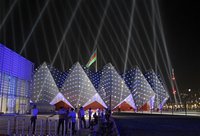Eurovision: From universal friendship to dirty politics
The winner of Eurovision Song Contest became known on Saturday night. Next year, the most independent Eurovision Song Contest on the planet that was held in Baku, Azerbaijan, will take place in Sweden. This year, the winner of the contest comes from Sweden - Loreen. Russia's Buranovskiye Babushki came second. The competition is independent primarily of the talents of the winners, expert opinions and musical trends. The outcome of the battle, as usual, is decided by friendly neighboring countries, homesick expatriates and advocates of democracy.

When in 1955 the "Eurovision" appeared, it was touching and harmless: the entertaining TV show was to promote friendship between peoples and the bizarre at the time idea of television. This was the goal of the European Broadcasting Union that borrowed the idea of the enchanting song show from the Music Festival in San Remo, Italy.
Years have passed, different countries are joining the contest, and it is becoming increasingly more prestigious. If the first "Eurovision" that was held in 1956 in the Swiss city of Lugano had a total of seven participating countries, in twenty years their number has increased to twenty, and now the competition that takes place on the stage of Azerbaijan has 42 competitors. What would unite people better than an amicable show that attracts millions of viewers all over Europe - and not only Europe?
Well, first, not all viewers. The thinking part of the population has long been ignoring the competition ongoing for 57 years. The TV show has become an outlet for the irrepressible participants and desperate housewives. And second, the desire to tear up over "Eurovision" can be only evoked in those who have not heard about the crazy political engagement of this event.
Take, for example, the Azerbaijani "Eurovision": not only the country mortally offended Armenia, who refused to come to Baku because of Azerbaijani's nationalist attacks on their president, but tried to engage other countries in a boycott. Azerbaijani Islamists who misbehave on the websites of the competition and give poor residents of the country prophetic films about a bleak future of Azerbaijan, accepting this heinous westernized circus, and forgetting about the true Islamic values, also have reasons to be offended.
Islamic Iran, too, does not exhibit much tolerance: after Baku declared its intention to host "Eurovision", Tehran withdrew its ambassador from Azerbaijan. Older European brothers resented the fact that Azerbaijan, running over democratic freedoms of the citizens, was "allowed" to host the contest.
Protests at "Eurovision" are a usual thing. Back in 1964 in Denmark, a man ran onto the stage with a banner "Down with the Franco and Salazar" to protest against the dictatorial regime in Spain and Portugal. In 1978, Jordan "covered" the performance of an Israeli singer with a bouquet of flowers, and then he became the leader in the voting, they interrupted the broadcast. Later the Jordanians were lied to that Belgium, that in fact took second place, won the competition.
Lebanon for many years refused to participate in the competition due to the fact that its enemy Israel was "hanging out" there. In 2007, the Israeli team in the qualifying round presented a composition about the crazy rulers who keep their fingers on the buttons ("Push the Button") - a blatant allusion to Iran's nuclear policy. However, the audience did not like the aggressive song and it did not get into the finals.
For a long time, "Eurovision" has been a bulwark of capitalism - the socialist camp did not go on stage behind the "Iron Curtain". However, in 1961 the competition was first attended by Yugoslavia, and in 1989 it won the first place. This visit showed its desire to throw off the shackles of socialism, and was strongly supported.
Europeans showed Serbia their disapproval when the country was headed by the nationalist Milosevic. A general boycott threw Serbs off the stage until 2004, when new Serbia and Montenegro were born and began the movement toward democracy.
Europeans have welcomed this achievement by giving the second place to the Serbian singers. Why not the first? The first place was given to Ukrainian Ruslana, who later supported the Orange Revolution. Serbia was encouraged with the first place in 2007, when in the spirit of liberalism, it "let go" of Montenegro.
Sometimes "Eurovision" delivers nice political presents. For example, in 2007 Estonia gave the maximum score to Russia. After the scandal with the dismantling of the monument to Soviet soldiers it was interpreted as a demonstration of political tolerance. Ukrainian Verka Serduchka with a song called "Lasha Tumbai" (supposedly something Mongolian, although the Mongols did not understand it) that rhymes with "Russia, goodbye!" made the Russians grind their teeth.
"Eurovision" would not look so much like a circus, if not for the fact that the "war in the sandbox" is only launched by the countries with strong civil-patriotic complexes. If you dig deeper, you can get stuck in a swamp of historical guilt and "medieval" land squabbles. Countries like Britain, France and Spain, by and large do not care who takes the first place, and their representatives look natural and carefree.
Julia Petropavlovskaya
Pravda.Ru
Subscribe to Pravda.Ru Telegram channel, Facebook, RSS!


